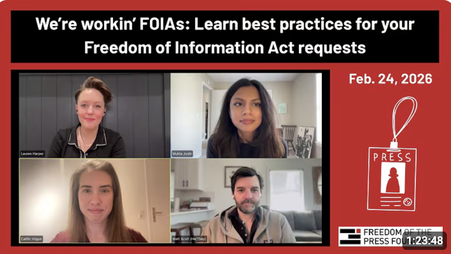Director of National Intelligence Tulsi Gabbard has reportedly fired a Freedom of Information Act official who “facilitated” the release of a document to Freedom of the Press Foundation (FPF) in response to a records request we filed in April.
The document — an intelligence community assessment — showed that most spy agencies overwhelmingly disagreed with the Trump administration’s rationale for deporting Venezuelan nationals to El Salvador.
It should go without saying that FOIA officers shouldn’t be fired for releasing information the administration wants to hide (nor should other intelligence community officials who author documents that don’t conform to the administration’s narrative).
At its best, this is exactly what FOIA is intended to do: Allow the public to dictate what is shared, not the government.
And blatant retaliation like Gabbard’s has the potential to have a chilling effect on FOIA offices across the government.
FPF won’t let that happen without a fight. We have filed additional requests about the processing of our April FOIA, and we will report what we learn about the spy agency’s attempt to stifle lawful disclosures.
(Maybe in the process we can encourage Gabbard’s office to restore its FOIA website, which is still missing its library of previously released FOIA documents and the agency’s FOIA regulations, even though they are supposed to be publicly available.)
Gabbard intimidating journalists
Gabbard isn’t just going after FOIA officials. She’s also targeting journalists who are informing the public about what her taxpayer-funded agency is doing.
FPF filed our April FOIA request largely because Gabbard claimed that the initial leak of the intelligence memo weeks earlier was so dangerous that it necessitated opening criminal investigations.
Attorney General Pam Bondi quickly agreed and used it as an excuse to create new, stricter rules around leaks to the media. Bondi explicitly called out The New York Times’ and The Washington Post’s reporting on the leaked memo in her decision to make it easier to target journalists and their sources.
The FOIA release to FPF proved the leaks didn’t damage national security and that rolling back journalists’ protections wasn’t necessary.
But Gabbard appears unwilling to back down in her crusade against the media.
She recently accused the Post’s veteran national security reporter Ellen Nakashima of “refusing to identify herself, lying about the fact that she works for the Washington Post,” and demanding intelligence officials share sensitive information with her in the course of her reporting.
Gabbard’s apparent attempt to intimidate a journalist from digging into her agency should not go unchallenged.
To that end, FPF filed a FOIA request for the documents and correspondence that Gabbard relied on to make these claims.
We’ll see if any documents even exist.
In the meantime, if you’re a journalist and want to know what to expect if the administration tries to come after you in the course of your newsgathering, check out our “Burn after reporting” panel. We hosted this event with Pulitzer Prize-winner James Risen and Ryan Lizza, the founder and editor of Telos.news and a former reporter at Politico, CNN, and The New Yorker. Listen and learn about the government’s efforts to silence them, and how the press can stand up for itself when it happens again.





